- Home
- Ursula Hegi
Ursula Hegi the Burgdorf Cycle Boxed Set Page 3
Ursula Hegi the Burgdorf Cycle Boxed Set Read online
Page 3
The doctor shook his head. “Even if we decide to amputate—I doubt she’ll leave here alive.”
My father turned from him and walked back into his mother’s room. Swiftly he gathered the blankets around her and lifted her from the bed.
“What are you doing?” The doctor tried to block his way.
“She is leaving here alive.”
“You can’t—”
“If she has to die, it will happen at home.” Through the layers of blankets my father felt his mother’s fever. Her flushed face sank against his shoulder as he carried her past the doctor.
In the week after my father brought Oma to our apartment, she grew stronger with each day as the fever released her body. While my mother painted upstairs in her studio, Oma and I looked through the books she’d asked my father to get from the shelves in her living room, books with magnificent photos of old paintings, and she’d tell me stories about the women and men who’d painted them.
My grandmother must have first noticed the smell in the healer’s apartment—a blend of camomile tea and worn socks that she’d describe to me later, a smell that threaded itself through the hallway and into the living room where the old man had taken her and my parents. The skin on his bald head looked as if it had been made for the skull of someone larger, heavier; yet, his eyes were brown and clear—the eyes of a much younger man. While he led my father into the kitchen for a cup of tea, my mother undressed Oma in the living room.
She took off the silk dress and slip.
She unhooked the salmon-colored corset with the stays.
She unlaced my Oma’s left shoe, then exposed her right leg where the shiny layer of skin at the end of the knee stump was drawn together in one puckered knot like an inside-out stocking pulled over a darning egg.
Despite the doubts that had almost kept her from coming to the healer’s apartment, Oma let my mother help her climb on the padded table and cover her with a frayed, clean sheet. When my mother called for the old man, he sent her to wait with my father in the kitchen.
Raised on her elbows, my grandmother watched the healer. From a bottle he shook a few drops of oil into his hands. It smelled of almonds. Inside the bottle floated the pit of a peach or something that looked very much like it. He rubbed the oil into his palms, and when he began massaging my Oma’s foot, his hands felt warm against her skin as if the oil had been heated. His fingers were blunt, his nails cut short.
He closed his eyes as he laid both hands on my Oma’s left knee. “Oh yes,” he said. “I thought so… There’s a lot here, a lot of things you’ve carried with you, that you’re holding on to. Your body—you’ve been pushing too hard, wanting to do it all alone.” His hand cupping her heel, he tried to push her toes back with his other hand. “So stiff,” he murmured. “So stiff. Not yielding like the foot of a woman.”
At first my Oma must have been embarrassed to have this stranger touch her foot, which has hardened with age. But his hands were soothing, and she sank deeper into the padded table. He asked her to lie on her stomach and gave her a folded towel to rest her head upon. One cheek against the mended terry cloth, she lay on the table, oddly at ease as the healer shook warm drops of oil on her back and kneaded them gently into her skin. Since my grandfather’s death, no man had seen my Oma undressed. Pleasure from touch had only come from her own hands, but now she felt herself stretching, widening under the hands of the healer, hands that rose from her back like the pearl gray wings of a dove, then lowered themselves like feathers brushing her skin.
Suddenly one of his fingers grazed her spine between her shoulders, and it felt as if a knife were pressing into her. She roared up.
“That’s part of it,” he whispered. “A lot of things have become part of your body, things we need to dissolve.”
She made herself sink back down, her face on the towel. His finger traced the outline of her spine like a white-hot blade—light, piercing.
“Are you using something? It feels like—”
“Only my hands,” he said, moving them in front of her where she could see them, the nails so short that the fleshy tip of each finger protruded. “Do you want me to go on?”
Though she remembered the pain, she could not recall its intensity as she looked at his broad hands. She closed her eyes, nodded, and willed herself to absorb the healing, to believe in it, to dissolve whatever stood in its way. When she had first heard about the healer from one of her old students, she couldn’t imagine anything beyond a laying on of hands the way Jesus did with the lepers, but this felt as if he were slicing through layers of muscles, shifting things dormant inside her.
I’m healing, she promised herself, trying not to flinch from him. That evening, when she returned to our apartment where she would stay with us through the rest of October and most of November, she undressed and checked her body for marks in front of the closet mirror, expecting to find red scratches, if not gashes, covering her back. Yet her skin would be unscathed, certain proof of his powers. Something within her already knew this, though she would have to test it later. And so she lay silent, my grandmother, face pressed into the towel to muffle involuntary screams, fingers gripping the edges of the padded table on either side of her head.
Each time the healer lifted his hands from her, she felt no pain at all. Her skin didn’t even tingle. It was hot in the room, hot and still. When the healer asked her to turn around, she followed his voice, somehow not minding that all she wore were white cotton underpants—not that new—and that her pale breasts flattened themselves against her ribs.
The healer rubbed almond-smelling oil on her belly; his right hand glided across her skin and opened up a warmth low within her. Only his index finger touched her—no harder than she would touch a child’s face to remove a loose eyelash—yet, she felt the searing tip of a blade though the pain was lessened by an odd sense of peace, as if she’d been inside this room with the old man for days, or forever—she couldn’t tell which—and he knew everything there was to know about her.
Months later, after her leg had healed, after the pain had contained itself into smaller and smaller areas until it had stopped entirely, after the sores and blisters had closed over with new, pink skin, my Oma recalled the sudden urgency that made her want to ask the old man how he worked his healing, and she was glad she’d remained silent because, even then, she sensed what she now believed—that only the gift can be shared, not the secret.
Maikäfer flieg
Dein Vater is im Krieg
Deine Mutter ist im Pommerland
Pommerland is abgebrannt
Maikäfer flieg
Ladybug fly
Your father is in the war
Your mother is in Pommerland
Pommerland has burned away
Lady bug fly
(German nursery rhyme)
Women in Distress
When our housekeeper, Klara Brocker, was alone in our apartment, she read romances that she borrowed from Trudi Montag’s pay-library. Except for names and settings the novels were alike and invariably ended with promises of eternal love and weddings. Perhaps Frau Brocker had heard those promises of eternal love too, but there’d been no wedding. The American soldier she’d met at the end of the war had left Burgdorf long before her son, Rolf, was born.
Frau Brocker hid the romances under the cover of our ironing board from where I retrieved them late at night and, with a flashlight under my blanket, read about women in distress and the men who rescued them. Each book jacket showed a beautiful woman leaning against something while she looked up at a man who wasn’t leaning against anything. My mother never leaned or slouched.
I was careful not to move the folded tissue Frau Brocker kept inserted as a bookmark, and if she ever suspected I read her romances, she didn’t say. A faster reader than she, I’d finish the novels days ahead of her and feel disappointed when, during one of my late night raids, I’d still find the same book. By the time I was twelve, I’d gone through everything we had on t
he birch shelves in our living room—the leather-bound volumes of Tolstoi my mother had given my father one Christmas, biographies of opera singers and painters, novels by Sigrid Undset and Thomas Mann—and I’d become as involved with Maria Callas and Anna Karenina as with the leaning women in Frau Brockets books.
Klara Brocker did not look like the women on the book jackets, though she wore bright lipstick and plucked her eyebrows into thin arches; instead of flowing gowns and high-heeled sandals she wore cotton shifts and white sneakers. Every three months she got a new permanent that drew her brown hair close against her scalp in spiral curls. Sometimes I wondered if she was waiting for a man to rescue her from the life that was so different from the lives of the women in the romances: she lived with her son, Rolf, and her mother, who’d had a stroke and was paralyzed on one side of her body.
Every day at one, when I came home from school, my mother left her studio and my father closed his dental office for an hour. Before we sat down to eat the meal Frau Brocker had prepared for us, she wrapped half of the food in towels to keep it hot and carried it in a basket to her apartment where she ate with her mother and Rolf.
Though she earned enough to rent a better place, she lived on the fourth floor of Barbarossastrasse 15, an old building with a dark staircase. She had three rooms: the narrow bedroom that she shared with her mother, a kitchen, and the living room where Rolf slept on the sofa.
She gave most of her money to St. Martin’s Church and tried to teach Rolf and me that only sacrifices brought real rewards. Those lessons were usually urged upon us when we sat at our kitchen table, eating thick pieces of her fruit pies or marbled pound cake. Our mouths full, we’d glance at each other, then at her, and nod.
The one indulgence she allowed herself was Gauloises, French cigarettes in a blue pack with the picture of a winged helmet, but even those she rationed, smoking only five a day. Unlike my mother who smoked while she did other things, Frau Brocker would stop whatever she was doing before she opened the silver foil at the top of the blue pack and lit one of the cigarettes.
On Sundays she wore tailored dresses that showed off her narrow waist and patent-leather shoes with medium-high heels. During mass she knelt in the third pew on the right side. Above the altar were three stained-glass windows; red, white, and black, they formed a pattern of hundreds of small crosses that intersected and overlapped. Frau Brocker was one of many people in Burgdorf who didn’t like the modern design. The original windows, shattered by bombs, had been replaced after the war. She preferred the old windows along the sides of the church; their blues and purples and golds formed stars that softened the incoming light. But the light above the altar was harsh as though the solitary priest on the marble stairs, raising the sacred chalice in an ancient ceremony, had little to do with her.
Saturday afternoons she parted the purple drapes of the confessional and confessed her sins to Herr Pastor Beier who sat behind the latticed wall, one ear tilted toward her sins. Long ago he must have granted her absolution for her biggest transgression, because she continued to raise her face toward the communion and to bring the consequence of her sin—Rolf—to church with her.
Every March and September the potato man, Herr Weinhart, refilled the wooden bin in Klara Brocker’s cellar. New potatoes would tumble from his burlap sack through the open top of the bin, covering old layers of tired potatoes whose wrinkled skins had been pierced by pale sprouts. She would look forward to eating the new potatoes, their firm flesh coated with butter. But she’d have to use up the old ones first, peel the gray skin from their flaccid centers, and submerge them in boiling water. By the time the new potatoes dropped to the trapdoor in front of the bin, they too would look wrinkled and gray. To buy smaller quantities would have been more expensive, and so she ordered fifty kilos twice a year.
That March, when the potato man rang the bell, she met him by the front door, the cellar key in her hand. He was a tall man with a wide smile. The burlap sack slung over one shoulder, he walked down the basement stairs ahead of her. Blond, curly hair covered his arms and wrists where the sleeves of his blue shirt had slipped up.
She shared the cellar with five other tenants; each of them had one section. In the dim light she found the keyhole while Herr Weinhart waited next to her. He smelled of new, clean sweat. Gray light, filtered through cobwebs and coal dust, kept the cellar just short of total darkness and deepened the corner shadows. She’d hidden here with her mother during air raids, safe—it turned out—while other buildings in town had been hit by bombs that made them look like broken teeth with blackened edges.
Her hand reached for the chain that hung from the ceiling bulb, and she stepped aside to let Herr Weinhart walk past. He stood before the rising clouds of dust as the potatoes rumbled into the open bin, then he shook the corners of the sack, and folded the burlap into a square. Though he didn’t resemble the American, his movements were the same, the long limbs and broad span of his shoulders.
“I guess that’s all,” he said and turned to leave.
She wanted to touch his cheek lightly, to run one finger along his throat.
“Are you coming up too?”
She crossed her arms. “In a while. You go ahead.” Her face hot, she listened to the sound of his footsteps moving away from her on the cellar stairs. The peculiar, dark odor of mold, cobwebs and dampness pressed against her. She pushed back her shoulders, shook her head.
The walls were lined with shelves, heavy with jars that sealed within them the flavor and smell of fruits and vegetables she’d canned last summer. On the third shelf stood jars with hazy contents, left over from her mother: APPLE-SAUCE 1948, BEANS 1950, STRAWBERRY MARMALADE 1949. Behind them stood two dusty bottles, the years 1924 and 1923 barely legible on the faded labels. They bore a different handwriting, the Old German script of her grandmother, who died before Klara was born.
Whenever she thought of throwing these bottles out, she felt an odd sense of resistance, as if they connected her to a simpler past. She held one of them against the light. The liquid was cloudy, thick. Hard to imagine the ripe cherries or strawberries whose juices had been squeezed into the neck of this bottle. The cork was crumbling and musty. It had smelled like that during the war. “I should throw these bottles out,” her mother had said more than once. “They’re probably pure poison by now.” But she’d only moved them further back to make room for the blankets she kept in the cellar for air raids.
Cautiously Klara returned the bottle to the shelf. None of the jars bore dates between 1942 and 1945. Anyone lucky enough to have food had eaten it. Except for the eighteen jars of peaches she and her mother had canned. A week after the American had been stationed in their building, he’d carried a crate of peaches up four flights of stairs to their apartment. He set the crate on their kitchen table and, while she and her mother watched, pried open the top to reveal golden-pink peaches, layers and layers of them. Her mouth suddenly dry, she ran her fingers across their fuzzy skins.
He laughed. “Here. Eat.” He held one of the peaches out to her. His teeth were white, and his short hair exposed a small, leaf-shaped birthmark on his forehead. On his left hand he wore a ring.
When Klara bit into the peach, juice dribbled down her chin, and she wiped it with the back of her left hand. At first she chewed slowly, embarrassed that he was watching her, but as the hunger rose from her belly to meet the food, she assuaged it by taking another bite. She couldn’t remember ever tasting anything so sweet, so good, and after the American left, she and her mother stood next to the table, eating peaches until their stomachs felt taut and the fronts of their dresses were damp with juice. Even after they gave some of the peaches to Herr Flemern, the tailor who lived on the first floor, and ate all the peaches they desired for an entire week, they had enough left to fill eighteen glass jars which they saved on the windowsill in the kitchen for special occasions. Amber half suns, the peaches floated in their own juice, emitting a golden glow that warmed the apartment.
M
ost of the peaches were still there when the American left three months later, but Klara wasn’t able to swallow them. Though her mother ate some, the remaining jars sat on the windowsill until Rolf was old enough to take solid food and eat them mashed, his one legacy from his father.
The relentless hunger of those years—occasionally Klara still felt it, even after a large meal. She felt it now as she looked at the shabby leather suitcase next to the cellar door. During the war it used to stand behind the sofa in the living room, packed with clothing and food. That was before the American had arrived. Whenever the sirens sounded off, she’d grab the suitcase with one hand, her mother’s arm with the other, and they’d rush down the stairs into the cellar, often without slippers, just wearing their nightgowns, and sit on layers of blankets that couldn’t block the chill of the cement floor. Though she was in her late teens and taller than her mother, Klara let herself be folded into her mother’s arms.
Eyes wide open in the dark, she thought of her father, who was fighting on the Russian front. His regiment had a goat, and when he sent photos, they’d be of him and several other men in uniforms, one of them always sitting on the goat. It seemed like a different war, not the kind where you hid from bombs, but where you could sit on a goat and laugh into a camera.
Sometimes she faded into sleep, rocking in her mother’s arms, and whenever she woke up, her mother smiled although the corners of her mouth trembled. “Don’t be afraid,” she’d whisper.
Klara wasn’t afraid the first time the American soldier took her into his arms right next to the potato bin, his wide shoulders shielding the frail glow of the ceiling bulb. That evening, and other evenings like it, the cement floor didn’t feel cold at all through the blankets on which they lay.
At first she believed he’d take her with him after the war to his faraway country where the sky was always blue, where coconuts and oranges grew on trees, where winter never came and the ocean was warm. And because the wife he’d left there was a shadowy figure in Klara’s mind, she assumed that, for him too, she had ceased to be real. Certainly he’d been apart from her for too long. Certainly it was Klara’s touch, now, that mattered.

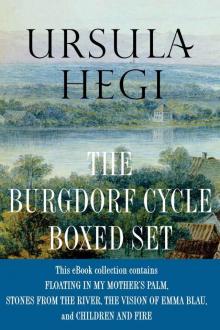 Ursula Hegi the Burgdorf Cycle Boxed Set
Ursula Hegi the Burgdorf Cycle Boxed Set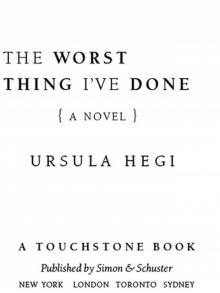 The Worst Thing I've Done
The Worst Thing I've Done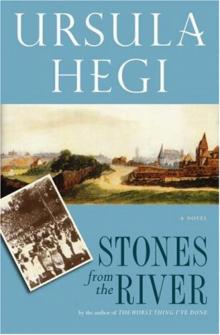 Stones From the River
Stones From the River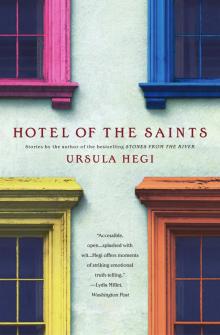 Hotel of the Saints
Hotel of the Saints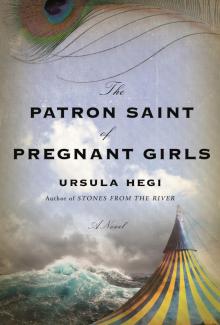 The Patron Saint of Pregnant Girls
The Patron Saint of Pregnant Girls